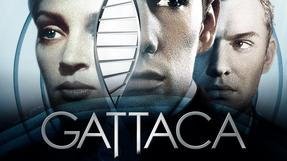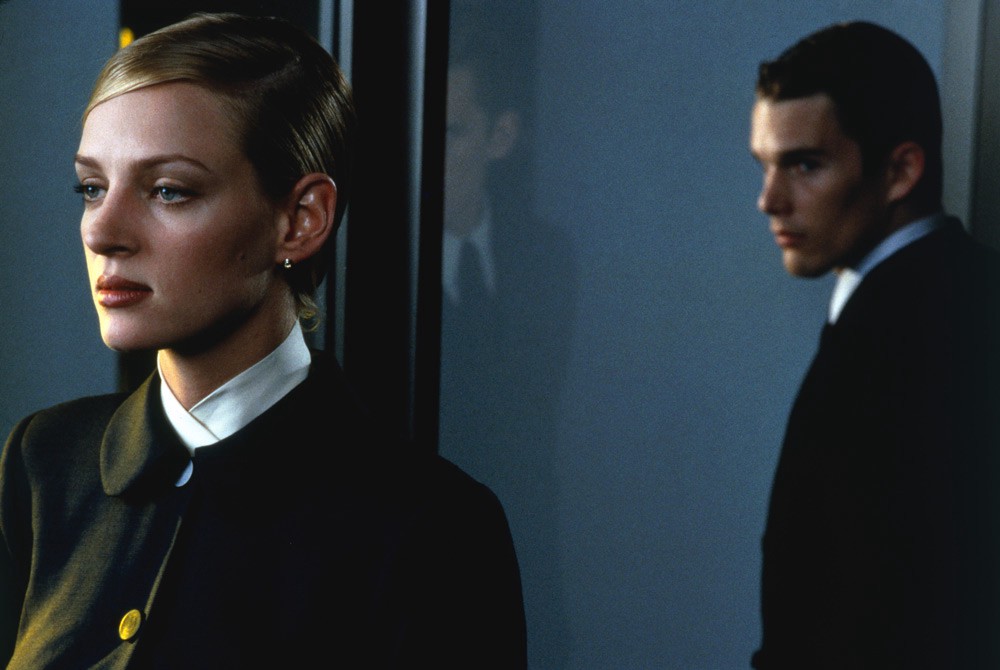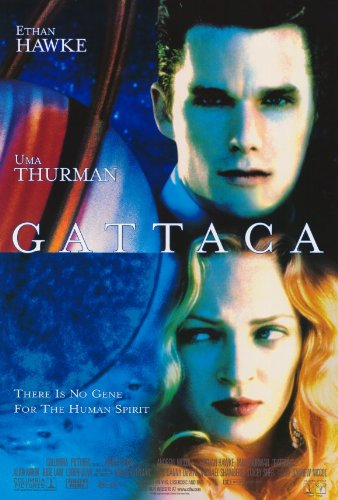20 years on, we?re just now catching up to Ethan Hawke & Uma Thurman?s prescient sci-fi noir.
 ?Gattaca? (Sony)
?Gattaca? (Sony)
The 1997 sci-fi movie Gattaca suffered from bad genes.
It had a weird name. It starred relatively unknown actors. It was a science fiction movie that looked more like an episode of Mad Men (which it predated by 10 years) than the alien-invasion movies popular at the time. And it centered on an issue that few people really understood: the consequences of prenatal genetic manipulation.
So it wasn?t a surprise when the film, from first-time director Andrew Niccol, tanked at the box office in its initial release: It took in a meager $12.5 million domestically against a reported production budget of $36 million. Even a proposed spinoff TV series was stillborn.
?Niccol?s script, which has the earnest simplicity of a freshman philosophy paper, is merely naked exploitation, a sci-fi snow job that projects a contemporary ethical question ? would a perfect human be human? ? into a solemn future where the worst-case scenario unfolds as conventional Hollywood melodrama,? Los Angeles Times critic Jack Mathews wrote at the time.
The times have caught up with ?Gattaca?
Like its protagonist ? the genetically inferior would-be astronaut Vincent Freeman (Ethan Hawke) ? Gattaca has surpassed the circumstances of its birth. In the years since its release, Gattaca has had influence far beyond its box-office reception, and critics now rank the movie as among the best films of its kind.
 Stream ?Gattaca? now on Tribeca Shortlist.
Stream ?Gattaca? now on Tribeca Shortlist.
Gattaca?the title refers to the nucleotides that make up DNA?tells the story of Vincent Freeman, who was born without the benefit of genetic engineering. His ambition is to join the crew of a space mission to one of Saturn?s moons, a job for which he is banned because of his genetic inferiority. But Freeman finds a way to masquerade as a genetically superior ?valid? and to work for the Gattaca Aerospace Corp., where he is literally a hair away from being discovered. When a murder takes place just before the Saturn mission, Vincent must find a way to preserve his secret while uncovering the truth behind the crime.
Timeout London in 2015 polled top scientists and creators of science fiction ? including physicists, authors and Oscar-nominated filmmakers, as well as sci-fi film and TV stars ? who ranked Gattaca ? 32 among the 100 best science fiction films of all time:
?The film succeeds so well because it?s not content simply to bask in its own ideas, escalating tension when an unrelated murder investigation threatens to unmask the protagonist?s existential masquerade.?
The movie holds an enviable 82 percent rating on the Rotten Tomatoes Tomatometer roundup of film critics.
 ?Gattaca? (Sony)
?Gattaca? (Sony)
Many agreed with the Chicago Sun-Times? Roger Ebert, who gave it three-and-a-half out of four stars. ?This is one of the smartest and most provocative of science fiction films, a thriller with ideas,? Ebert wrote in 1997, arguing that it captured a moral dilemma specific to its time:
?Science fiction in the movies has recently specialized in alien invasions, but the best of the genre deals with ideas. At a time when we read about cloned sheep and tomatoes crossed with fish, the science in ?Gattaca? is theoretically possible. When parents can order ?perfect? babies, will they? Would you take your chances on a throw of the genetic dice, or order up the make and model you wanted? How many people are prepared to buy a car at random from the universe of all available cars? That?s how many, I suspect, would opt to have natural children.?
 That tagline probably didn?t help the film?s poor box office.
That tagline probably didn?t help the film?s poor box office.
And Gattaca caught the attention of real-world scientists and policy-makers who were concerned about the very issues it raised. At the time of its release, Princeton University molecular biologist Lee M. Silver wrote, ?Gattaca is a film that all geneticists should see if for no other reason than to understand the perception of our trade held by so many of the public-at-large.?
Scientific American in 2013 cited Gattaca in a story about advances in prenatal genetic manipulation and saw it as a warning about its consequences:
?The Freemans are characters in the science fiction film Gattaca, which explores liberal eugenics as an unintended consequence of certain technologies meant to assist human reproduction. Although Antonio and Marie do not exist outside the movie?s imaginary universe, their real-life counterparts could be walking among us sooner than we think ? and, in a sense, they already are.?
Most important, Gattaca may have been responsible in part for preventing the very future it depicted, Slate reported in 2014:
?But in 2008, heading off a Gattaca-esque future, Congress passed GINA, the Genetic Information Nondiscrimination Act, which makes it illegal for employers or health insurers to base their decisions on your genes. And Gattaca, a film seen by millions, if not tens of millions, helped lay the groundwork for GINA.?
?Gattaca? remains a touchstone for anyone concerned about eugenics, genetic discrimination and genetic testing.
Sen. Rand Paul, R-Kentucky, even got himself in hot water by apparently plagiarizing the Wikipedia entry on Gattaca during a campaign speech on behalf of Virginia GOP gubernatorial candidate Ken Cuccinelli in 2013.
Paul used language strikingly similar to Wikipedia?s in arguing against genetic testing, citing Gattaca as a cautionary tale.
Paul said the controversy was ?making a mountain out of a molehill? and added that he properly credited the film?s creators in describing the film?s plot. (Cuccinelli lost.)
Antagony & Ecstasy?s Tim Brayton reappraised the film in 2016 and found that it held up despite the passage of time.
?It?s enormously literary for a movie with no direct literary antecedent, and this gets it into a little trouble here and there, particularly in the exposition. But much more than that, this quality is one of the film?s best strengths; as a piece of idea-driven writing, it?s directly in line with the finest speculative fiction of the mid-20th Century Golden Age, using a reasonably appealing genre plot (it?s a murder mystery, at heart) as the pretext for grappling with Big Ideas about where society is, where it?s going, and what that will mean for us wee tiny human beings. And so what if it?s not always perfect in the execution, or if the passage of some two decades have made the 1997 film feel a little morally panicked about an ethical crisis that?s not quite as right around the corner as it seemed at the time ? better a film that gets lost in its own intellectual ambitions than one content to succeed at being nothing at all.?
See Ethan Hawke, Uma Thurman and Jude Law in Gattaca on Tribeca Shortlist now.

